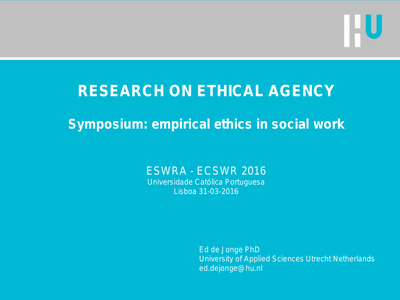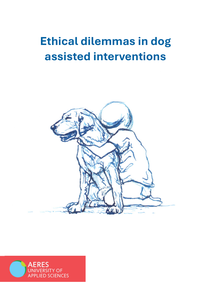Aim: Midwives are expected to identify and help resolve ethics problems that arise in practice, skills that are presumed to be taught in midwifery educational programs. In this study, we explore how midwives recognize ethical dilemmas in clinical practice and examine the sources of their ethics education. Methods: We conducted semi-structured, individual interviews with midwives from throughout the United States (U.S.) (n = 15). Transcripts of the interviews were analysed using an iterative process to identify themes and subthemes. Findings: Midwives described a range of professional ethical dilemmas, including challenges related to negotiating strained interprofessional relationships and protecting or promoting autonomy for women. Ethical dilemmas were identified by the theme of unease, a sense of distress that was expressed in three subthemes: uncertainty of action, compromise in action, and reflecting on action. Learning about ethics and ethical dilemmas occurred, for the most part, outside of the classroom, with the majority of participants reporting that their midwifery program did not confer the skills to identify and resolve ethical challenges. Conclusion: Midwives in this study reported a range of ethical challenges and minimal classroom education related to ethics. Midwifery educators should consider the purposeful and explicit inclusion of midwifery-specific ethics content in their curricula and in interprofessional ethics education. Reflection and self-awareness of bias were identified as key components of understanding ethical frameworks. As clinical preceptors were identified as a key source of ethics learning, midwifery educators should consider ways to support preceptors in building their skills as role models and ethics educators.
DOCUMENT

Abstract Background: Healthcare professionals encounter ethical dilemmas and concerns in their practice. More research is needed to understand these ethical problems and to know how to educate professionals to respond to them. Research objective: To describe ethical dilemmas and concerns at work from the perspectives of Finnish and Dutch healthcare professionals studying at the master’s level. Research design: Exploratory, qualitative study that used the text of student online discussions of ethical dilemmas at work as data. Method: Participants’ online discussions were analyzed using inductive content analysis. Participants: The sample consisted of 49 students at master’s level enrolled in professional ethics courses at universities in Finland and the Netherlands. Ethical considerations: Permission for conducting the study was granted from both universities of applied sciences. All students provided their informed consent for the use of their assignments as research data. Findings: Participants described 51 problematic work situations. Among these, 16 were found to be ethical dilemmas, and the remaining were work issues with an ethical concern and did not meet criteria of a dilemma. The most common problems resulted from concerns about quality care, safety of healthcare professionals, patients’ rights, and working with too few staff and inadequate resources. Discussion: The results indicated that participants were concerned about providing quality of care and raised numerous questions about how to provide it in challenging situations. The results show that it was difficult for students to differentiate ethical dilemmas from other ethical work concerns. Conclusion: Online discussions among healthcare providers give them an opportunity to relate ethical principles to real ethical dilemmas and problems in their work as well as to critically analyze ethical issues. We found that discussions with descriptions of ethical dilemmas and concerns by health professionals provide important information and recommendations not only for education and practice but also for health policy.
DOCUMENT

Symposium ESWRA - ECSWR 2016: empirical ethics in social work. Objective: ethical aspects of social work (esp. at home) Structure: cooperation of the research group of UAS Utrecht Netherlands with six regional welfare organizations Method: practice based ethics research Focus on professional practice: learning from moral experiences in frontline practice (cf. Van Doorn, 2008) Hybrid approach: combining theoretical resources and professional practice (cf. Banks & Gallagher, 2009) Mixed methods: desk research, interviews, best practice units (BPU), development of ethical tools
DOCUMENT

26 BUas lecturers of all 5 academies have contributed to a textbook titled ‘Ethical Dilemmas in the Creative, Cultural and Service Industries’. The book was edited by Johan Bouwer, Professor of Ethics in Business and Profession. The idea for this book was born a few years ago when our university started a project leading to the inclusion of (facets of business) ethics in all of our educational programmes, thereby acknowledging the industry’s need to attract professionals who are also able to address ethical dilemmas in their work. 21 Cases have been included in the book, covering a wide range of ethical dilemmas, which transcend national borders. Major ethical issues such as Corporate Social Responsibility, ethical leadership, human rights, fraud, employee rights and duties, new technology and (social) entrepreneurship are addressed. ‘Ethical Dilemmas in the Creative, Cultural and Service Industries’ is designed to enhance professional ethical awareness and supports student’s development of skills for ethical decision-making in professional practice.
LINK
This document presents the findings of a study into methods that can help counterterrorism professionals make decisions about ethical problems. The study was commissioned by the Research and Documentation Centre (Wetenschappelijk Onderzoeken Documentatiecentrum, WODC) of the Dutch Ministry of Security and Justice (Ministerie van Veiligheid en Justitie), on behalf of the National Coordinator for Counterterrorism and Security (Nationaal Coördinator Terrorismebestrijding en Veiligheid,NCTV). The research team at RAND Europe was complemented by applied ethics expert Anke van Gorp from the Research Centre for Social Innovation (Kenniscentrum Sociale Innovatie) at Hogeschool Utrecht. The study provides an inventory of methods to support ethical decision-making in counterterrorism, drawing on the experience of other public sectors – healthcare, social work, policing and intelligence – and multiple countries, primarily the Netherlands and the United Kingdom
DOCUMENT

The guidance offered here is intended to assist social workers in thinking through the specific ethical challenges that arise whilst practising during a pandemic or other type of crisis. In crisis conditions, people who need social work services, and social workers themselves, face increased and unusual risks. These challenging conditions are further compounded by scarce or reallocated governmental and social resources. While the ethical principles underpinning social work remain unchanged by crises, unique and evolving circumstances may demand that they be prioritised differently. A decision or action that might be regarded as ethically wrong in ‘normal’ times, may be judged to be right in a time of crisis. Examples include: prioritising individual and public health considerations by restricting people’s freedom of movement; not consulting people about treatment and services; or avoiding face-to-face meetings.
MULTIFILE

If you are looking for examples of just how special dogs are, you will find thirteen wonderful examples in this book. These dogs have a knack for calming people down and picking up on tension—sometimes even better than we do! Each story highlights the incredible bond between dogs and humans, showcasing their unique talents. But there's more to it than just heartwarming tales.When dogs get involved in caregiving, it opens up a lot of questions and challenges. Some of these are more straightforward, like what health benefits come from having a dog around or how effective other methods are without using a dog. At the same time, the mix of caregiver, dog, and client brings up important questions about how to do the right thing, treat both people and animals well and evaluate various options available. That’s where ethics come into play—the core theme of this collection of stories. We’re not here to tell you what’s right or wrong; instead, we want to spark conversations about these topics. Ethics can be quite personal, but that doesn’t mean you have to tackle these decisions alone. By sharing experiences and discussing challenges, we can support each other and make better choices together.This collection of stories is part of a bigger two-year project that looks at how animal-assisted interventions affect the well-being of dogs. The research comes from the Human-Animal Interactions research group at Aeres University of Applied Sciences in Dronten, working alongside partners in the field, and was co-funded by the Regieorgaan SIA (Taskforce for Applied Research SIA), which is part of the Dutch Research Council (NWO). If you want to learn more about this research, check out the Human-Animal Interactions research group’s website.
DOCUMENT

In today's world, understanding different viewpoints is key for societal cohesion and progress. Robots have the potential to provide aid in discussing tough topics like ethnicity and gender. However, comparably to humans, the appearance of a robot can trigger inherent prejudices. This study delves into the interplay between robot appearance and decision-making in ethical dilemmas. Employing a Furhat robot that can change faces in an instant, we looked at how robot appearance affects decision-making and the perception of the robot itself. Pairs of participants were invited to discuss a dilemma presented by a robot, covering sensitive topics of ethnicity or gender. The robot either adopted a first-person or third-person perspective and altered its appearance accordingly. Following the explanation, participants were encouraged to discuss their choice of action in the dilemma situation. We did not find significant influences of robot appearance or dilemma topic on perceived anthropomorphism, animacy, likeability, or intelligence of the robot, partly in line with previous research. However, several participants hearing the dilemma from a first-person perspective changed their opinion because of the robot's appearance. Future work can expand with different measures such as engagement, in order to shed light on the intricate dynamics of human-robot interaction, emphasizing the need for thoughtful consideration in designing robot appearances to promote unbiased engagement in discussions of societal significance
DOCUMENT

This article aims to explore the moral ideas and experiences that students at Dutch universities of applied sciences (UAS) have of being a professional with an ‘ethical compass.’Semi-structured interviews were held with 36 fourth-year Bachelor students divided over four institutions and three different programmes: Initial Teacher Educa- tion, Business Services and Information and Communication Technology. Findings show that students say they strive to be(come) moral professionals, but that they have difficulties recognising and articulating the moral aspects of their professional roles. They seem to lack a moral vocabulary and the moral knowledge to verbalise their aspirations and to provide arguments to explicate or legitimise their moral behaviour. While most students were critical of the support they received from their universities, they indicated that various other role models and (work) experiences did have a strong and positive influence on their moral development. In this article, we reflect on the findings in relation to international empirical research on students’ moral development and highlight the characteristics of UAS students.
DOCUMENT

This chapter explores the legal and moral implications of the use of data science in criminal justice at two levels: police surveillance and the criminal trial of a defendant. At the first level, police surveillance, data science is used to identify places and people at high risk of criminal activity, allowing police officers to target surveillance and take proactive measures to try to prevent crime (predictive policing). At the second level, the criminal trial of a defendant, data science is used to make risk assessments to support decisions about bail, sentencing, probation, and supervision and detention orders for high-risk offenders. The use of data science at these levels has one thing in common: it is about predicting risk. The uncertainty associated with risk prediction raises specific related legal and ethical dilemmas, for example in the areas of reasonable suspicion, presumption of innocence, privacy, and the principle of non-discrimination.
DOCUMENT